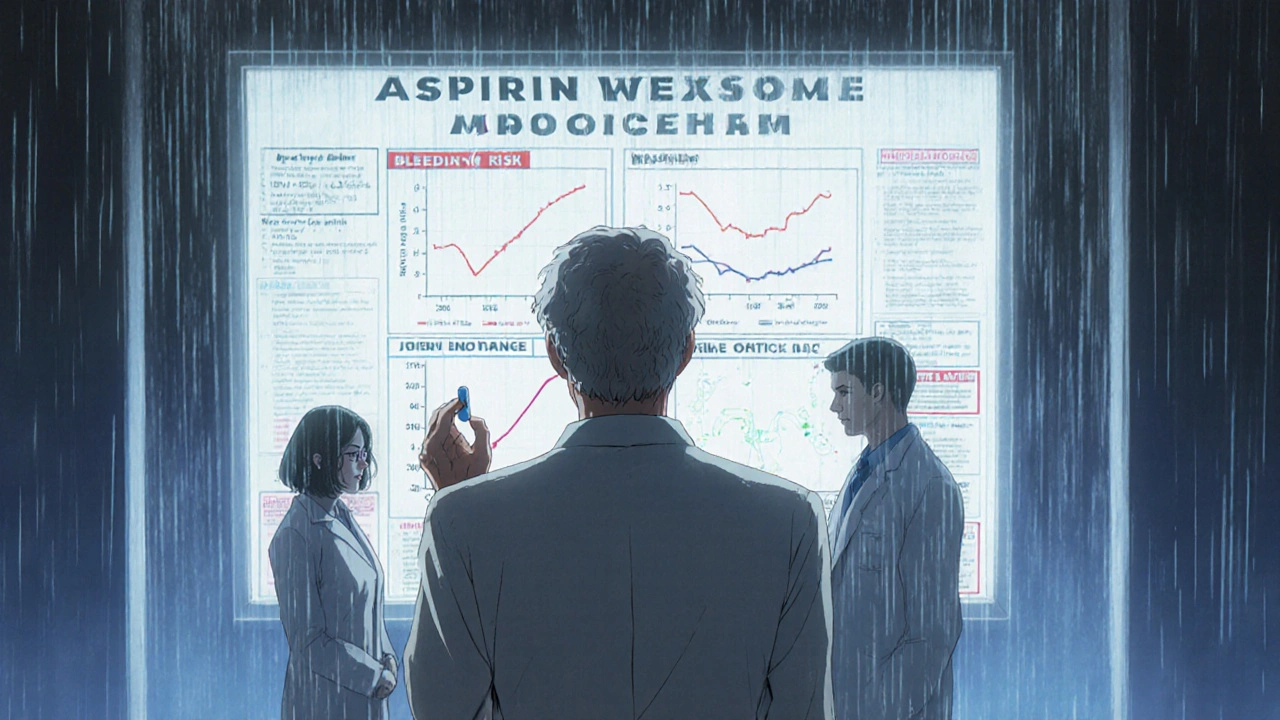Aspirin Therapy for Heart Disease Prevention: Who Really Needs It?
 Nov, 17 2025
Nov, 17 2025
For decades, taking a daily low-dose aspirin was common advice for anyone worried about heart disease. If your parent had a heart attack, your doctor probably told you to start a baby aspirin. But that advice has changed-dramatically. As of 2025, most healthy adults should not take aspirin to prevent their first heart attack or stroke. The risks now often outweigh the benefits. This isn’t just a minor tweak in guidelines. It’s a full reversal based on over a decade of new evidence from large, high-quality studies.
Why Aspirin Was Once Recommended
Aspirin works by blocking platelets-tiny blood cells that clump together to form clots. In people who already have narrowed arteries from plaque buildup, a clot can trigger a heart attack or stroke. Aspirin’s ability to thin the blood made it seem like a perfect shield for those at risk. For people who’d already had a heart attack, stroke, or stent placement, aspirin remains one of the most effective, low-cost tools to prevent another event. That’s called secondary prevention, and it still works.But using aspirin before any heart problem occurs-that’s primary prevention. And that’s where things went wrong. For years, doctors assumed that if aspirin helped people with existing heart disease, it would help healthy people too. But the science didn’t support that. Three major studies published in 2018 (ASPREE, ASCEND, ARRIVE) showed that for most healthy adults, aspirin didn’t reduce heart attacks or strokes enough to justify the bleeding risks.
Who Shouldn’t Take Aspirin for Prevention
If you’re 60 or older and have never had a heart attack, stroke, or stent, do not start aspirin. The U.S. Preventive Services Task Force (USPSTF) updated its guidelines in 2022 to say clearly: avoid initiating aspirin for primary prevention in adults 60 and older. Why? Because the risk of serious bleeding-especially in the stomach or brain-goes up sharply with age. By 65, the chance of a major bleed from aspirin is higher than the chance of preventing a first heart event.Even if you’re under 60, you shouldn’t take aspirin unless you’re at high risk. Many people assume that having a family history of heart disease means they need aspirin. That’s not enough. Your dad might’ve had a heart attack at 58, but if you don’t smoke, your blood pressure is normal, your cholesterol is under control, and you don’t have diabetes, your actual risk is low. Aspirin won’t help you-and it might hurt you.
Who Might Still Benefit
There’s a small group of people between 40 and 59 who might still benefit from aspirin. But only if they meet all of these conditions:- They have a 10% or higher risk of having a heart attack or stroke in the next 10 years
- They have no increased risk of bleeding
- They’re willing to take it daily for at least 10 years
- They’ve talked it through with their doctor
To calculate your 10-year risk, your doctor uses a tool called the ACC/AHA Pooled Cohort Equation. It asks for your age, sex, race, total cholesterol, HDL (good cholesterol), systolic blood pressure, whether you have diabetes, and if you smoke. If your score is below 7.5%, aspirin is not recommended. At 10% or higher, it becomes a possible option-but still not automatic.
One group where aspirin is still often considered: people with type 2 diabetes who are over 40 and have at least one other risk factor, like high blood pressure or smoking. The American Diabetes Association still says aspirin might help here, because diabetes is such a strong risk factor for heart disease. But even then, the decision isn’t one-size-fits-all.

What Counts as High Bleeding Risk?
Before even thinking about aspirin, you need to check your bleeding risk. If you’ve had:- A stomach ulcer or GI bleed in the past
- Regular use of NSAIDs like ibuprofen or naproxen
- Heavy alcohol use (more than 3 drinks a day)
- Blood thinners like warfarin or apixaban
- Uncontrolled high blood pressure
- Age over 65
…then aspirin is likely dangerous for you. Doctors use a tool called HAS-BLED to score this. A score of 3 or higher means high bleeding risk-and aspirin should be avoided.
One study found that for every 100 people like you taking aspirin for 10 years, about 1 might avoid a heart attack-but 2 might have a serious bleed that needs hospitalization or a blood transfusion. That’s not a good trade-off.
Why So Many People Still Take It
Despite the guidelines, an estimated 29 million Americans without heart disease still take daily aspirin. Why? Because habits die hard. Many people were told years ago to take it, and never re-evaluated. Others rely on family history as their main reason: “My dad had a heart attack at 55, so I’m taking it.” But genetics alone don’t justify aspirin. You can’t control your genes, but you can control your blood pressure, cholesterol, weight, and smoking habits.Another reason: misinformation. Online forums, social media, and even well-meaning friends tell people aspirin is “good for the heart.” But the science doesn’t back that up for healthy people. In fact, a 2022 study found that 58% of adults aged 60-75 in the U.S. were still taking aspirin for prevention, even though most of them didn’t meet the high-risk criteria.
What to Do Instead
If you’re not taking aspirin for prevention, what should you focus on? These four things are far more effective and safer:- Take a statin if your cholesterol is high or you have diabetes. Statins reduce heart attack risk by 25-37%. Aspirin? Only 10-15%.
- Control your blood pressure. Keeping it under 120/80 cuts heart disease risk more than any pill.
- Don’t smoke. Quitting cuts your heart attack risk in half within a year.
- Move daily. Just 30 minutes of brisk walking five days a week reduces heart disease risk by 30%.
These lifestyle changes don’t just lower your risk-they improve your energy, sleep, mood, and longevity. Aspirin does none of that. It only lowers clotting risk, and even then, only for a small group.

What If You’re Already Taking It?
If you’ve been taking low-dose aspirin (75-100 mg) daily for years and you’re over 60 with no history of heart disease, don’t stop suddenly. Talk to your doctor. Stopping abruptly can increase short-term clot risk. But if you’re over 70, have no heart history, and are taking aspirin just because “it’s good for you,” you’re probably better off stopping. Your doctor can help you taper off safely.Some people worry about stopping because they feel like they’re giving up protection. But think of it this way: you’re not losing protection-you’re removing a risk that never should’ve been there in the first place.
Aspirin vs. Other Options
Aspirin is cheap-about $4 to $6 for a three-month supply. But it’s not the only option. Newer antiplatelet drugs like clopidogrel are more targeted and cause less stomach bleeding. But they’re also much more expensive and still not recommended for primary prevention. Statins, on the other hand, are now the cornerstone of heart disease prevention. They don’t just lower cholesterol-they stabilize plaque, reduce inflammation, and lower the risk of heart attack by more than aspirin ever could.For most people, aspirin is no longer the right tool. Statins, blood pressure control, and lifestyle changes are.
What’s Next for Aspirin Therapy?
Research is still ongoing. The ASPREE-2 trial is looking at whether stopping aspirin after age 70 affects dementia or physical decline. The American Heart Association plans to update its guidelines in 2024, possibly using coronary calcium scans to better identify who might still benefit. These scans can show hidden plaque buildup-even in people who feel fine.But the direction is clear: aspirin’s role in heart disease prevention is shrinking. It’s no longer a general health habit. It’s a targeted medical decision, only for a small group of high-risk adults under 60 who have no bleeding risks-and even then, only after a careful conversation with a doctor.
For the vast majority of people, the best way to protect your heart isn’t a pill you swallow every morning. It’s walking, eating well, managing stress, getting your numbers checked, and working with your doctor-not following outdated advice.
Should I take aspirin every day to prevent a heart attack?
Only if you’re between 40 and 59, have a 10% or higher 10-year risk of heart disease, and have no bleeding risks. For most people-especially those over 60 or without heart disease-daily aspirin does more harm than good. Talk to your doctor before starting or stopping.
Is aspirin safe for people with diabetes?
It might be considered for people with type 2 diabetes over 40 who have at least one other heart disease risk factor, like high blood pressure or smoking. But it’s not automatic. The decision depends on individual bleeding risk and overall health. Many endocrinologists and cardiologists now prefer statins and lifestyle changes over aspirin for diabetic patients.
Can I take aspirin if I drink alcohol?
If you drink more than three alcoholic drinks a day, aspirin significantly increases your risk of stomach bleeding. Alcohol irritates the stomach lining, and aspirin reduces the protective mucus. Together, they can cause ulcers or serious bleeding. Avoid aspirin if you drink heavily.
What’s the right dose of aspirin for heart prevention?
If your doctor recommends aspirin, the standard dose is 75-100 mg per day. That’s the equivalent of one low-dose or "baby" aspirin. Higher doses don’t offer more protection and increase bleeding risk. Never take more than recommended without medical advice.
I’ve been taking aspirin for years. Should I stop?
If you’re over 60 and have never had a heart attack, stroke, or stent, you should talk to your doctor about stopping. Don’t quit cold turkey-your doctor can help you taper safely. If you’re under 60 and have no bleeding risks, you might still benefit. But if you’re taking it just because your parent had a heart attack, you likely don’t need it anymore.
Does aspirin help prevent stroke?
Aspirin slightly lowers the risk of ischemic stroke (caused by a clot), but not hemorrhagic stroke (caused by bleeding in the brain). In fact, aspirin can increase the risk of the latter. For most healthy people, the small reduction in ischemic stroke risk doesn’t balance the increased risk of brain bleeding. That’s why guidelines don’t recommend it for stroke prevention in people without prior events.


Conor McNamara
November 18, 2025 AT 11:46theyve been lying to us for decades... aspirin is just a cover-up for the pharmaceuticals to keep us dependent... i read on a forum that the FDA banned it in the 90s but they buried it... my uncle stopped taking it and his blood pressure dropped overnight... they dont want you to know this
steffi walsh
November 20, 2025 AT 05:54thank you for writing this!! i was so confused because my aunt swears by her daily aspirin and now i finally get why her doctor told her to stop 😊
Leilani O'Neill
November 21, 2025 AT 12:22Of course the USPSTF says this-because they’re influenced by Big Pharma’s lobbying dollars. Real medicine isn’t about pills. It’s about discipline, ancestral wisdom, and rejecting the weak, chemical-dependent mindset of modern society. You want to prevent heart disease? Stop eating processed carbs, lift weights, and stop trusting bureaucrats who wear lab coats like costumes.
Riohlo (Or Rio) Marie
November 22, 2025 AT 21:59Let’s be real-this whole aspirin narrative is a masterclass in medical theater. We’ve been conditioned to believe that a $0.02 tablet can substitute for self-awareness, emotional regulation, and basic metabolic hygiene. The fact that 29 million Americans still swallow it like a morning prayer is less about medical ignorance and more about our collective refusal to confront the truth: we’d rather take a pill than change our lives. The real epidemic isn’t heart disease-it’s denial wrapped in a prescription bottle.
Brenda Kuter
November 23, 2025 AT 15:44So I've been taking it since 2010 because my dad had a heart attack at 56. Now I'm 63. Do I stop? I'm terrified. My doctor says 'maybe' but won't give me a straight answer. I don't know what to do anymore. I feel like I've been lied to my whole adult life.
Shaun Barratt
November 25, 2025 AT 01:47The data presented here is methodologically sound and aligns with the 2022 USPSTF recommendations. The risk-benefit calculus for primary prevention in asymptomatic individuals has been thoroughly evaluated across multiple prospective cohort studies with low attrition rates. The statistical significance of increased gastrointestinal and intracranial hemorrhage events in individuals over 60 is robust (p < 0.001). Clinical decision-making must remain individualized, but population-level guidelines are appropriately conservative.
Iska Ede
November 25, 2025 AT 14:18so you're telling me i've been swallowing tiny white lies for 15 years... and the only thing it did was give me a stomach ulcer? thanks for the update, doctor. i'll be sure to add 'regret' to my daily vitamins 😌
Gabriella Jayne Bosticco
November 27, 2025 AT 10:04This is such an important post. I work with older patients and so many are still on aspirin because their GP prescribed it 20 years ago and no one ever revisited it. The real win here isn’t just avoiding bleeding-it’s redirecting energy toward what actually works: movement, sleep, stress management. These aren’t ‘alternatives’-they’re the foundation. Aspirin was never the hero. Lifestyle was.
Sarah Frey
November 27, 2025 AT 11:03Thank you for this clear, evidence-based breakdown. I’ve seen too many patients continue aspirin out of habit, fear, or misinformation. The shift away from primary prevention is not a retreat-it’s a refinement of medical practice. The emphasis on statins, blood pressure control, and lifestyle interventions reflects a more holistic, sustainable approach to cardiovascular health. This is medicine evolving for the better.
Katelyn Sykes
November 28, 2025 AT 19:16just stopped my aspirin last month after reading this and my digestion is already better and i dont feel like im poisoning myself every morning. also started walking 30 mins a day and i swear i have more energy. who knew the answer wasnt in a pill but in my own two feet
Gabe Solack
November 29, 2025 AT 08:31aspirin = 🚫
statins = ✅
walking = 🌟
sleep = 💤
your doctor = 🤝
your heart = ❤️
you = 💪
Yash Nair
November 30, 2025 AT 04:55in india we dont take aspirin for prevention we take it for pain and fever. americans think every problem needs a pill. you dont need aspirin you need discipline. eat real food. dont sit. move. stop watching screens. your heart will thank you. this is western medicine weakness
Bailey Sheppard
December 1, 2025 AT 17:52I get why people hold onto aspirin-it feels like control. But you’re right: real control comes from knowing your numbers, moving your body, and trusting your doctor-not a bottle in your medicine cabinet. I stopped mine last year. No regrets. Just better sleep and less anxiety about my health.
Girish Pai
December 2, 2025 AT 01:38The ASCEND and ASPREE trials demonstrate a clear NNT of 100 for cardiovascular event reduction versus NNH of 50 for major bleeding in primary prevention cohorts. The ACC/AHA Pooled Cohort Equation remains the gold standard for risk stratification. The paradigm shift reflects evidence-based medicine triumphing over inertia. Clinicians must now prioritize individualized risk assessment over blanket prophylaxis. The future lies in precision prevention-coronary calcium scoring, lipidomics, and inflammatory biomarkers will soon supersede aspirin as a blunt instrument.